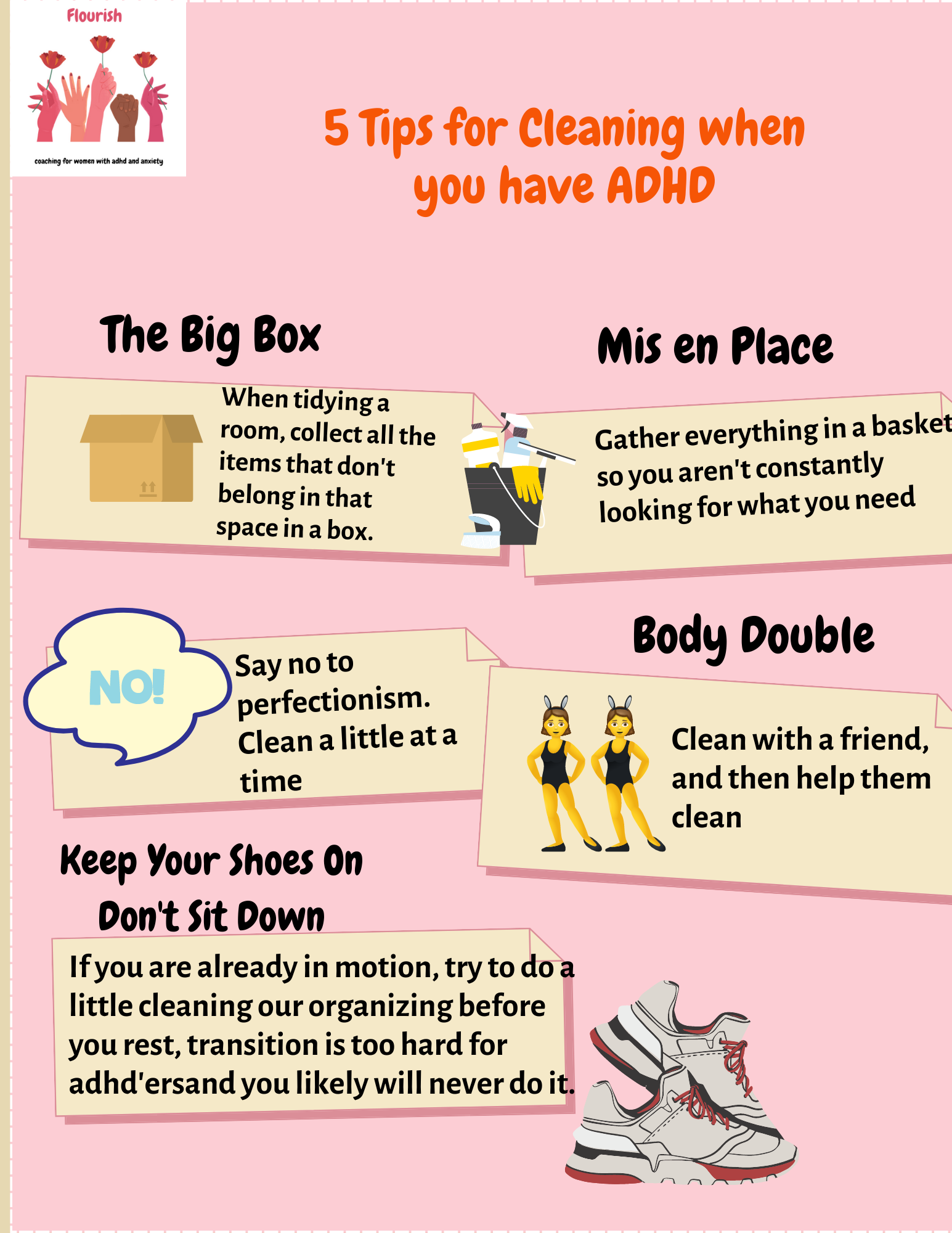Understanding ADHD Symptoms in Women: A Comprehensive Exploration

Common Symptoms That Are Often Overlooked
In women, ADHD symptoms may not always fit the stereotypical image of hyperactivity and impulsivity. Instead, they may present in more subtle ways, such as:
- Executive Functioning Issues: Executive Functioning Issues: Struggles with time management, planning, prioritizing, organizing, memory, and motivation. These difficulties often include problems initiating tasks. Research shows that approximately 80% of women with ADHD experience significant impairments in executive functions like working memory and planning (Brown, 2020).
- Stress Management Issues: Challenges with managing stress due to heightened emotional sensitivity, contributing to anxiety and emotional overwhelm.
- Procrastination: Tendency to delay important tasks, often due to being overwhelmed or having difficulty initiating action.
- Self-Esteem and Self-Concept Issues: Challenges stemming from societal expectations and gender roles, leading to feelings of inadequacy or failure.
- Cognitive Overload and Information Processing Difficulties: Overwhelm caused by an inability to filter out distractions, making it difficult to process new information.
- Masking: Women with ADHD often hide their struggles by 'masking' their symptoms to fit societal expectations. This behavior, which often begins in childhood, has been found in over 70% of women with ADHD (Quinn & Madhoo, 2022). Professionals frequently misinterpret it as stress or anxiety, contributing to delayed diagnoses."
- Perfectionism: Setting excessively high standards to overcompensate for perceived shortcomings, often leading to burnout and self-criticism.
- Emotional Regulation Issues: Struggles with managing emotions, including Rejection Sensitivity Dysphoria (RSD), where perceived criticism triggers intense emotional reactions.
- Energy Management Issues: Difficulty maintaining energy levels throughout the day, leading to inconsistent productivity and burnout.
- Exacerbation of Symptoms During Hormonal Cycles: Symptoms often worsen during hormonal changes across a woman’s lifespan, including menstruation, pregnancy, perimenopause, and menopause.
- Cycles of Burnout: Experiencing repeated cycles of emotional and mental exhaustion, which escalate in severity and length over time.
- Sleep Issues: Difficulty falling asleep, staying asleep, or experiencing restful sleep, which worsens ADHD symptoms.
- Co-Occurring Physical Issues: Many women with ADHD experience related physical conditions such as migraine, fibromyalgia, IBS, and more.
- Sensory Issues include heightened sensitivity to sounds, lights, textures, or smells, which can lead to sensory overload and discomfort in overstimulating environments. These sensitivities can cause anxiety, irritability, and difficulty concentrating, making everyday tasks more challenging.
Comorbid Mental Health Conditions
Women with ADHD often have additional mental health issues, which can make diagnosis and treatment more complicated. In fact, research has shown that nearly 60% of women with ADHD have co-occurring conditions, such as anxiety disorders or depression (Kooij et al., 2023). These overlapping conditions can obscure the primary diagnosis, leading to misdiagnosis or underdiagnosis.
Some include:
- Anxiety disorders (such as Generalized Anxiety Disorder or Social Anxiety)
- Depression (such as Major Depression or Persistent Depression)
- Bipolar disorder
- Eating disorders (like Binge Eating Disorder or Bulimia)
- Substance use disorders
- Obsessive-Compulsive Disorder (OCD)
- Post-Traumatic Stress Disorder (PTSD)
These overlapping conditions can sometimes hide or confuse ADHD symptoms, leading to misdiagnosis.
Masking ADHD Symptoms in Women
Women with ADHD often hide their struggles by "masking" their symptoms to fit societal expectations. This usually starts in childhood and is misunderstood by professionals, who might see it as stress, anxiety, or personality traits instead of ADHD. Over time, masking can lead to burnout, emotional exhaustion, and delayed diagnosis. Check out the masking page for more about masking behaviors, their long-term effects, and the quiz.
Subtle Hyperactivity and Impulsivity
While boys with ADHD often show obvious signs of hyperactivity, girls and women tend to have more subtle symptoms. These might include talking too much, feeling mentally restless, or making impulsive decisions. These less noticeable signs contribute to the underdiagnosis of ADHD in women.
Hormonal Influences on ADHD Symptom Severity
Hormonal fluctuations play a significant role in ADHD symptoms in women, with estrogen acting as a key modulator of dopamine. For example, symptoms tend to worsen during the luteal phase of the menstrual cycle due to the sharp decline in estrogen, which affects cognitive and emotional regulation (Williamson & DeVille, 2022). The more estrogen you have, the more access you have to dopamine. Estrogen is essential for regulating attention, memory, and emotional stability, which means fluctuating estrogen levels can exacerbate aspects of your adhd symptoms.
Menstrual Cycle:
- During the luteal phase (the week before menstruation), declining estrogen levels worsen symptoms like poor concentration, impulsivity, and mood swings.
Pregnancy and Postpartum:
- Estrogen levels rise during pregnancy, sometimes reducing ADHD symptoms, but postpartum hormone drops can intensify inattention and emotional sensitivity.
Menopause:
- Long-term declines in estrogen during menopause often exacerbate ADHD symptoms, making emotional regulation, memory, and attention even more challenging to manage.
For more detailed discussions, visit our pages on menopause, your period, and perimenopause and depression.
Executive Dysfunction in Women with ADHD
Executive dysfunction refers to difficulty managing daily tasks. Women with ADHD often struggle with the following:
- Working Memory: Trouble holding on to and using information.
- Inhibitory Control: Difficulty controlling distractions and impulses.
- Cognitive Flexibility: Struggles with adapting to new situations.
- Planning and Organization: Challenges in creating structure and setting goals.
- Time Management: Trouble estimating time or meeting deadlines.
- Task Initiation: Delaying or avoiding tasks because starting them feels overwhelming.
- Emotional Regulation: Difficulty managing emotions.
- Self-Monitoring: Trouble keeping track of progress and performance.
(See the Executive Dysfunction page for more information on improving executive functioning.)
Cognitive Overload and Information Processing Difficulties
Cognitive overload occurs when women with ADHD become overwhelmed by too much information or too many stimuli. This makes it hard to process new information effectively and can result in mental fatigue.
ADHD Symptoms related to cognitive overload and information processing difficulties include:
- Difficulty filtering out distractions, leading to mental fatigue.
- Struggling to follow conversations, especially in noisy environments or group settings.
Perfectionism and ADHD in Women
Many women with ADHD develop perfectionism as a coping mechanism for perceived failings in organization and focus. Research suggests that up to 65% of women with ADHD report struggling with perfectionism, which often leads to increased stress and burnout (Guo, 2024).
Time Blindness in ADHD Women
Time blindness is a common issue for women with ADHD. Difficulty in accurately estimating how long tasks will take often results in chronic lateness and missed deadlines, contributing to feelings of overwhelm and stress.
Task Initiation and Procrastivity
Procrastivity—when women engage in less important tasks to avoid more critical ones—frequently occurs when tasks seem overwhelming or unstructured. This leads to delayed task initiation and added stress as deadlines approach.
Sleep Issues and ADHD in Women
Women with ADHD commonly report insomnia, difficulty falling asleep, or frequent waking, which exacerbates ADHD symptoms during the day. Studies suggest that up to 70% of women with ADHD experience sleep disturbances, with conditions such as Delayed Sleep Phase Disorder and Restless Leg Syndrome frequently co-occurring (Matte et al., 2021). These sleep issues significantly contribute to daytime fatigue and cognitive impairments.
Sleep Disorders:
- Delayed Sleep Phase Disorder: A common issue where women with ADHD feel more alert at night and struggle with early mornings.
- Restless Leg Syndrome (RLS) is leg discomfort that interferes with sleep. It is commonly reported in women with ADHD.
- Insomnia: Difficulty falling asleep or staying asleep is a frequent complaint, leading to daytime fatigue and worsened ADHD symptoms.
- Other sleep disorders like sleep apnea are also common.
Sleep Hygiene strategies like setting consistent sleep routines and creating a calming pre-bedtime environment can help.
Sensory Sensitivity and ADHD Symptoms in Women
Women with ADHD often experience sensory overload, where bright lights, loud sounds, or certain touches and textures can become overwhelming. This sensitivity can make focusing in chaotic environments even more difficult.
Noise-canceling headphones, low-stimulus work environments, and sensory-friendly spaces can reduce overload and improve focus.
Hyperfocus and ADHD in Women
Hyperfocus allows women with ADHD to become deeply absorbed in tasks, often losing track of time. Hyperfocus is a primary symptom of adhd, which is about managing attention. While this can be productive, it can also lead to exhaustion and stress. Learn about hyperfocus here.
Rejection Sensitivity and Emotional Intensity
Struggles with managing emotions, including Rejection Sensitivity Dysphoria (RSD), where perceived criticism triggers intense emotional reactions, are common among women with ADHD. Research indicates that around 60% of women with ADHD experience significant emotional dysregulation, including heightened sensitivity to rejection and difficulty recovering from emotional setbacks (Young & Bramham, 2022)
Difficulty with Emotional Transitions
Women with ADHD may struggle to transition between emotional states, which can lead to lingering frustration or emotional overwhelm. This can make it hard to recover from emotional triggers or setbacks.
Burnout and Exacerbation of ADHD Symptoms
Masking behaviors and societal pressures often trigger burnout in women with ADHD. Over time, the stress of masking and trying to meet external expectations can lead to emotional detachment, mental exhaustion, and worsening ADHD symptoms.
Recognizing burnout early and incorporating rest and self-care into daily routines can help mitigate its effects.
Co-Occurring Physical Illnesses and Sleep Disorders in Women with ADHD
Many women with ADHD experience related physical conditions such as migraines, fibromyalgia, and IBS, with studies indicating that around 50% of women with ADHD suffer from chronic pain conditions like fibromyalgia (Kooij et al., 2023). These physical issues, combined with ADHD, often exacerbate cognitive and emotional challenges
Co-Occurring Physical Illnesses:
- Chronic Fatigue Syndrome (CFS): Many women with ADHD report persistent fatigue, making focus and cognitive functioning even harder.
- Fibromyalgia: Chronic pain, significantly associated with ADHD, can compound mental and physical fatigue.
- Irritable Bowel Syndrome (IBS): Stress-induced gastrointestinal issues frequently co-occur with ADHD.
- Migraines: Common in women with ADHD, often brought on by sensory overload or stress.
These physical conditions usually overlap with ADHD symptoms, making diagnosis and treatment more challenging. For more details, visit the Co-Occurring Conditions page. A comprehensive approach to supporting ADHD and co-occurring conditions improves overall well-being but rarely exists for women.
Impact on Relationships and Self-Perception of These Symptoms
The pressure to hide ADHD symptoms and meet societal expectations can harm relationships. Women with ADHD may struggle with emotional regulation, picking up on social cues, and communicating in neurotypical ways, which can lead to challenges in both personal and professional relationships. Over time, these struggles can also impact self-esteem, leading to feelings of inadequacy.
Developing self-compassion and embracing neurodivergent strengths are essential.
Recognizing that ADHD symptoms are not personal failings but part of how the brain functions can help women reframe their experiences.
For more on self-compassion and relationships, visit these pages.
Conclusion: Conclusion: The Path to Recognition and Healing for Women with ADHD
It’s often challenging for women with ADHD to get recognized, diagnosed, and adequately supported. However, healing and growth are possible once you learn to understand and affirm your unique strengths.



